Units1-2 讲义(含解析) 2023-2024学年牛津译林版七年级英语下册
文档属性
| 名称 | Units1-2 讲义(含解析) 2023-2024学年牛津译林版七年级英语下册 |
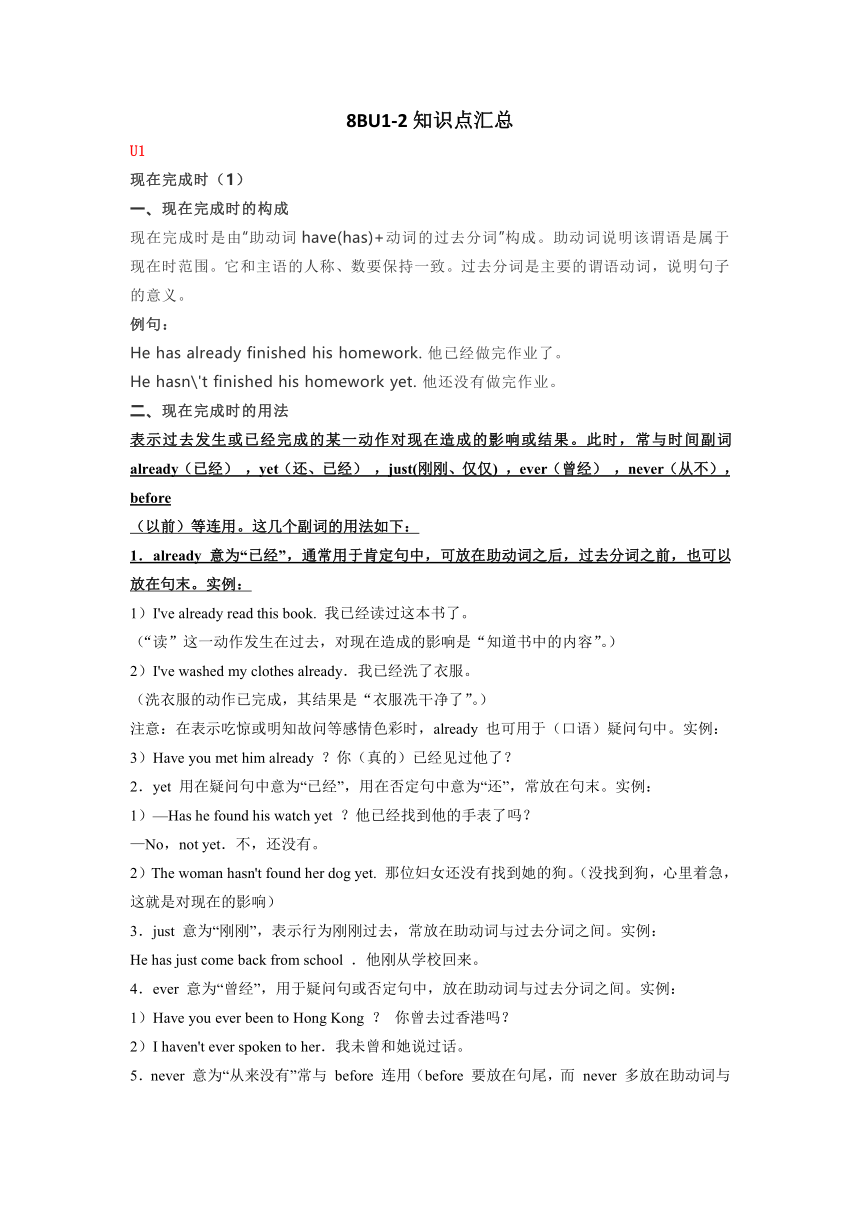
|
|
| 格式 | docx | ||
| 文件大小 | 271.3KB | ||
| 资源类型 | 教案 | ||
| 版本资源 | 牛津译林版 | ||
| 科目 | 英语 | ||
| 更新时间 | 2024-05-13 15:17:55 | ||
图片预览

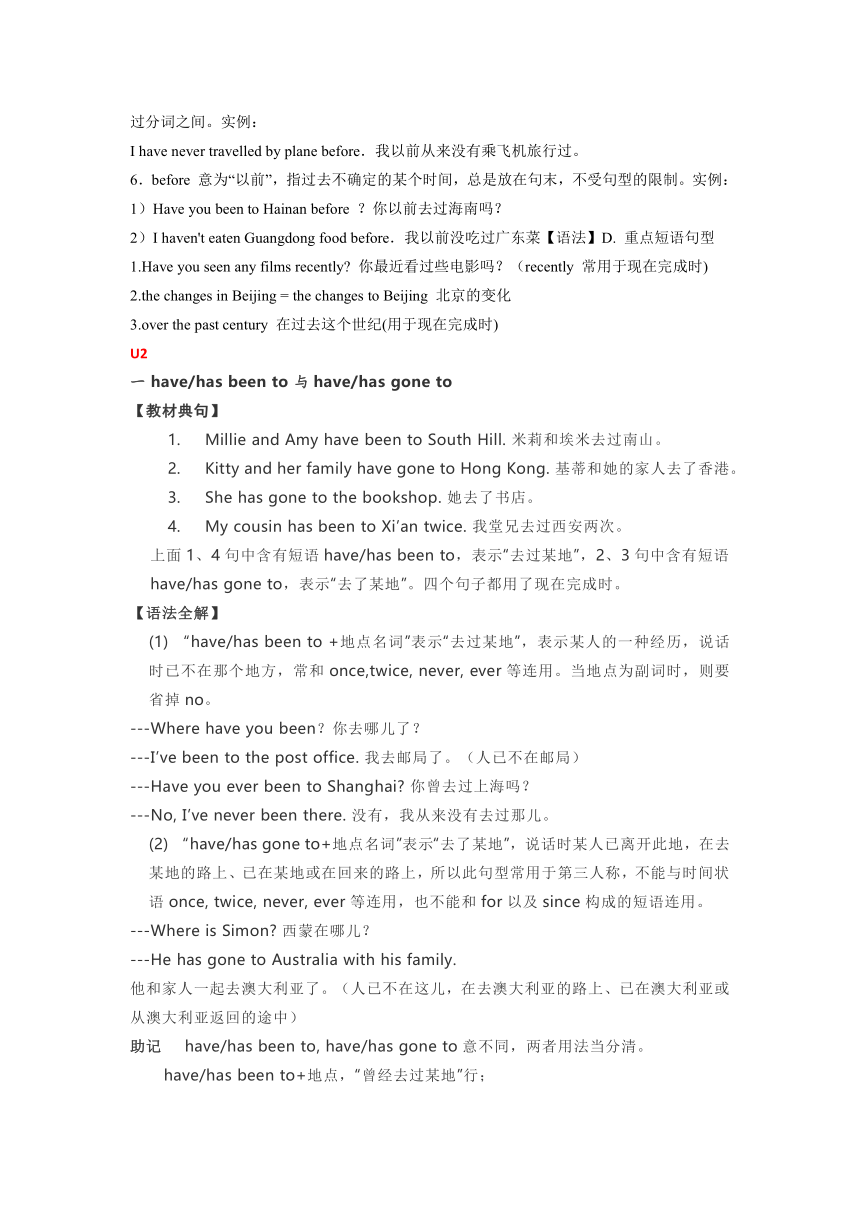
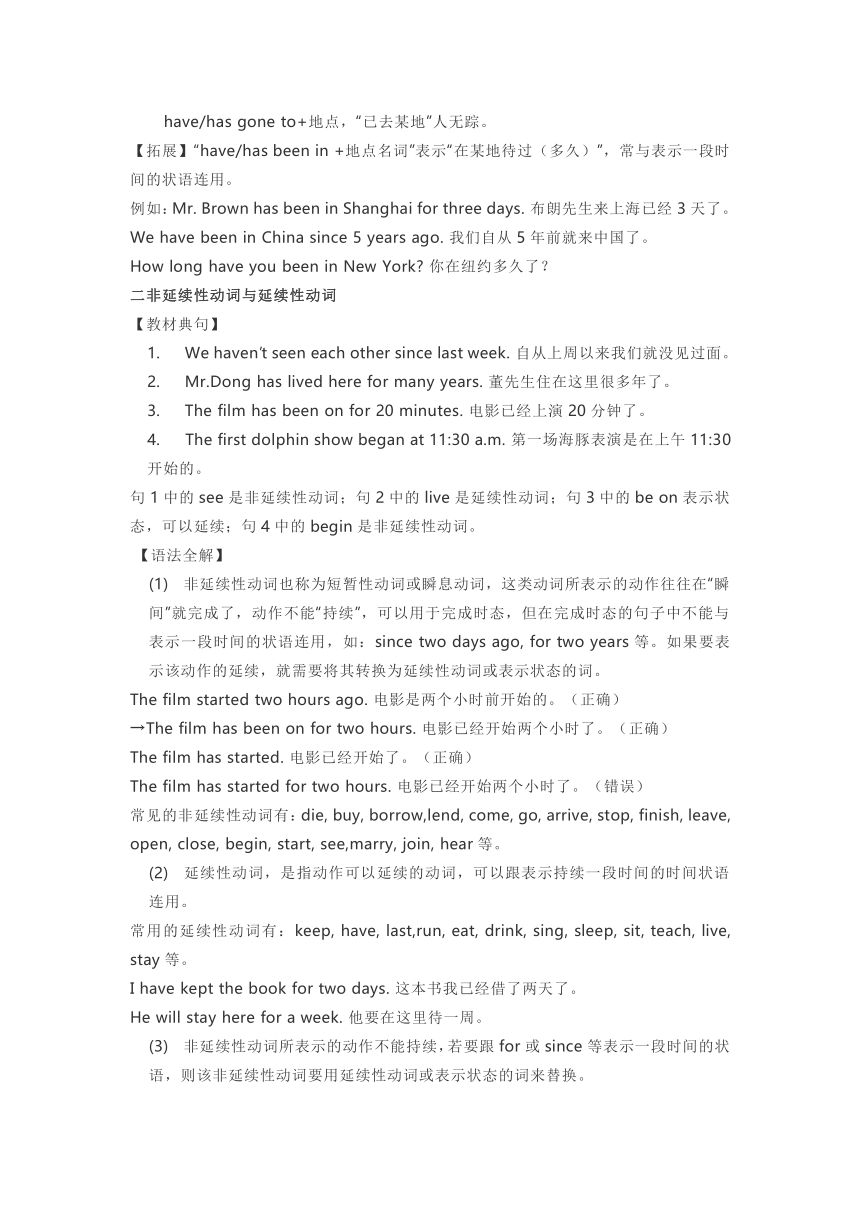
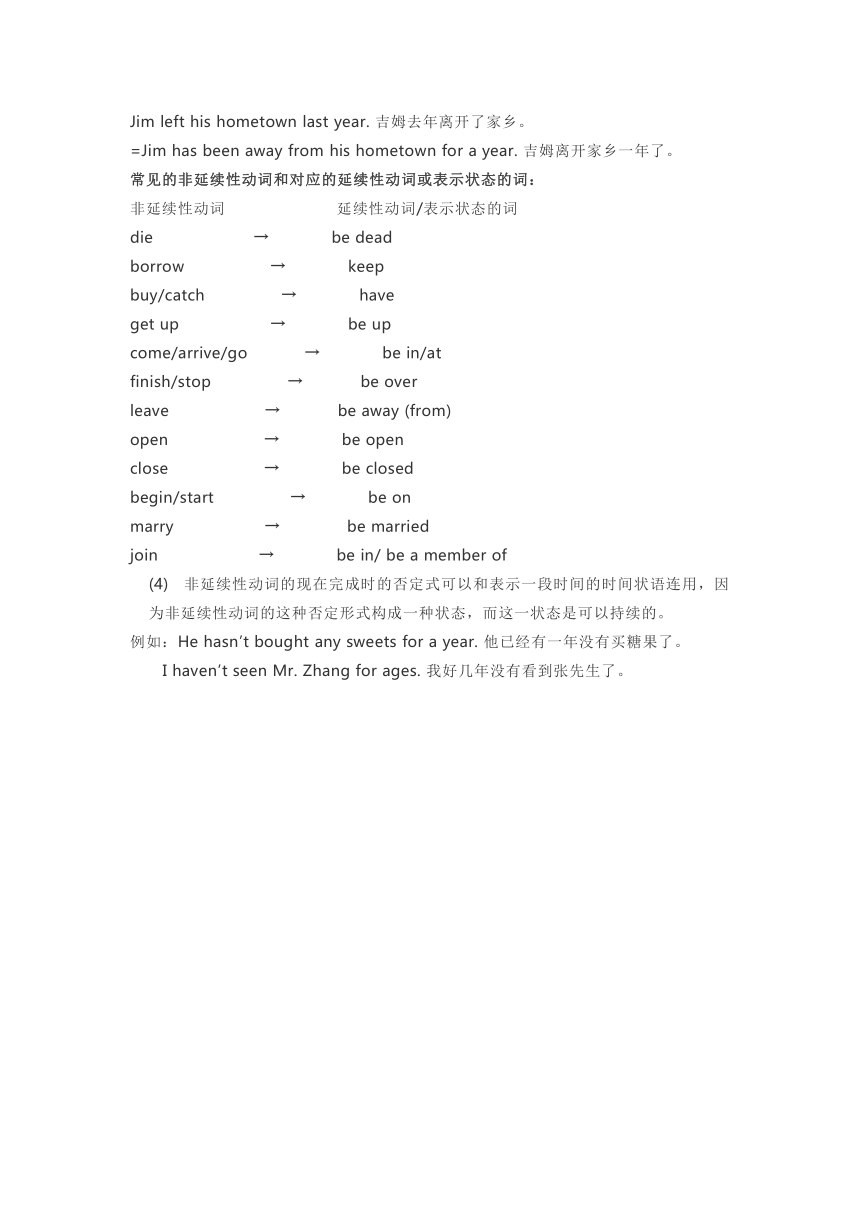
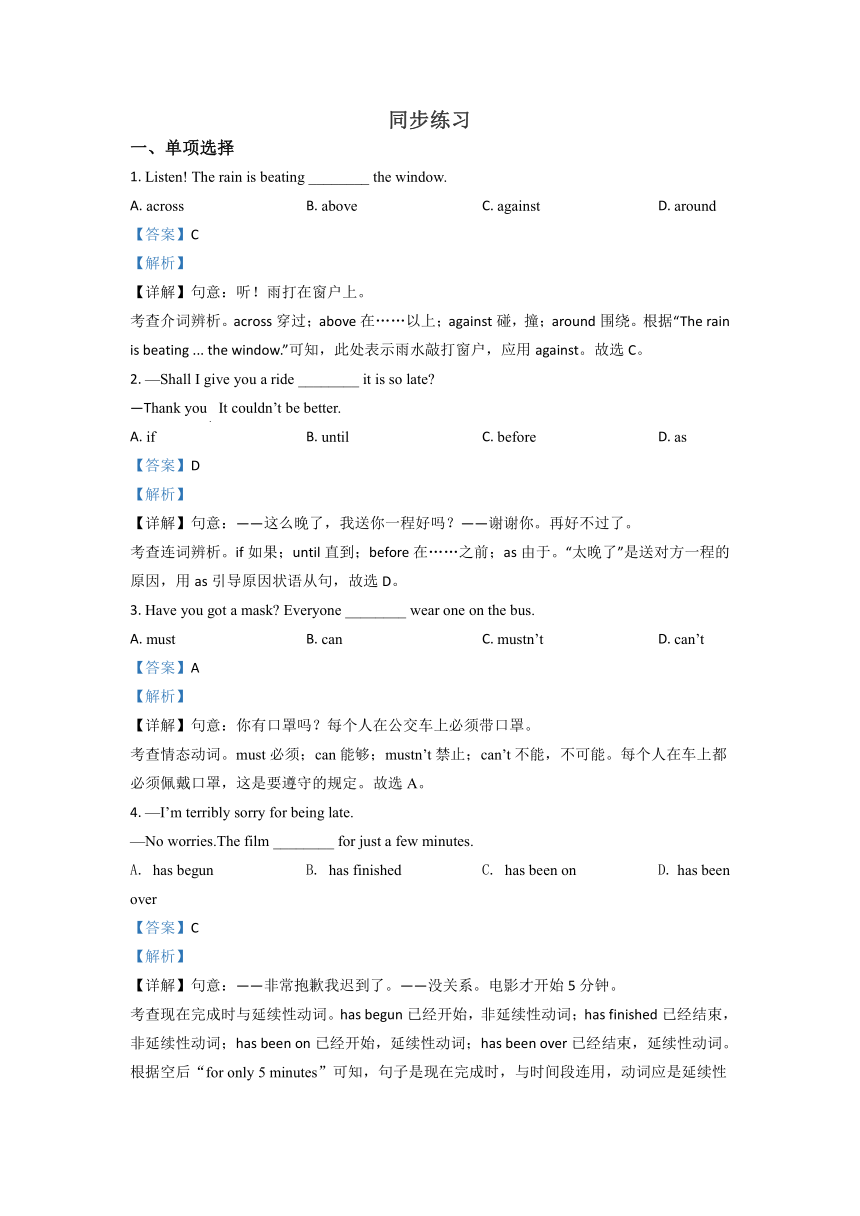
文档简介
8BU1-2知识点汇总
U1
现在完成时(1)
一、现在完成时的构成
现在完成时是由“助动词have(has)+动词的过去分词”构成。助动词说明该谓语是属于现在时范围。它和主语的人称、数要保持一致。过去分词是主要的谓语动词,说明句子的意义。
例句:
He has already finished his homework. 他已经做完作业了。
He hasn\'t finished his homework yet. 他还没有做完作业。
二、现在完成时的用法
表示过去发生或已经完成的某一动作对现在造成的影响或结果。此时,常与时间副词 already(已经) ,yet(还、已经) ,just(刚刚、仅仅) ,ever(曾经) ,never(从不) ,before
(以前)等连用。这几个副词的用法如下:
1.already 意为“已经”,通常用于肯定句中,可放在助动词之后,过去分词之前,也可以放在句末。实例:
1)I've already read this book. 我已经读过这本书了。
(“读”这一动作发生在过去,对现在造成的影响是“知道书中的内容”。)
2)I've washed my clothes already.我已经洗了衣服。
(洗衣服的动作已完成,其结果是“衣服冼干净了”。)
注意:在表示吃惊或明知故问等感彩时,already 也可用于(口语)疑问句中。实例:
3)Have you met him already ?你(真的)已经见过他了?
2.yet 用在疑问句中意为“已经”,用在否定句中意为“还”,常放在句末。实例:
1)—Has he found his watch yet ?他已经找到他的手表了吗?
—No,not yet.不,还没有。
2)The woman hasn't found her dog yet. 那位妇女还没有找到她的狗。(没找到狗,心里着急,这就是对现在的影响)
3.just 意为“刚刚”,表示行为刚刚过去,常放在助动词与过去分词之间。实例:
He has just come back from school .他刚从学校回来。
4.ever 意为“曾经”,用于疑问句或否定句中,放在助动词与过去分词之间。实例:
1)Have you ever been to Hong Kong ? 你曾去过香港吗?
2)I haven't ever spoken to her.我未曾和她说过话。
5.never 意为“从来没有”常与 before 连用(before 要放在句尾,而 never 多放在助动词与过分词之间。实例:
I have never travelled by plane before.我以前从来没有乘飞机旅行过。
6.before 意为“以前”,指过去不确定的某个时间,总是放在句末,不受句型的限制。实例:
1)Have you been to Hainan before ?你以前去过海南吗?
2)I haven't eaten Guangdong food before.我以前没吃过广东菜【语法】D. 重点短语句型
1.Have you seen any films recently 你最近看过些电影吗?(recently 常用于现在完成时)
2.the changes in Beijing = the changes to Beijing 北京的变化
3.over the past century 在过去这个世纪(用于现在完成时)
U2
一 have/has been to 与have/has gone to
【教材典句】
1. Millie and Amy have been to South Hill. 米莉和埃米去过南山。
2. Kitty and her family have gone to Hong Kong. 基蒂和她的家人去了香港。
3. She has gone to the bookshop. 她去了书店。
4. My cousin has been to Xi’an twice. 我堂兄去过西安两次。
上面1、4句中含有短语have/has been to,表示“去过某地”,2、3句中含有短语have/has gone to,表示“去了某地”。四个句子都用了现在完成时。
【语法全解】
(1) “have/has been to +地点名词”表示“去过某地”,表示某人的一种经历,说话时已不在那个地方,常和once,twice, never, ever等连用。当地点为副词时,则要省掉no。
---Where have you been?你去哪儿了?
---I’ve been to the post office. 我去邮局了。(人已不在邮局)
---Have you ever been to Shanghai 你曾去过上海吗?
---No, I’ve never been there. 没有,我从来没有去过那儿。
(2) “have/has gone to+地点名词”表示“去了某地”,说话时某人已离开此地,在去某地的路上、已在某地或在回来的路上,所以此句型常用于第三人称,不能与时间状语once, twice, never, ever等连用,也不能和for以及since构成的短语连用。
---Where is Simon 西蒙在哪儿?
---He has gone to Australia with his family.
他和家人一起去澳大利亚了。(人已不在这儿,在去澳大利亚的路上、已在澳大利亚或从澳大利亚返回的途中)
助记 have/has been to, have/has gone to意不同,两者用法当分清。
have/has been to+地点,“曾经去过某地”行;
have/has gone to+地点,“已去某地”人无踪。
【拓展】“have/has been in +地点名词”表示“在某地待过(多久)”,常与表示一段时间的状语连用。
例如:Mr. Brown has been in Shanghai for three days. 布朗先生来上海已经3天了。
We have been in China since 5 years ago. 我们自从5年前就来中国了。
How long have you been in New York 你在纽约多久了?
二非延续性动词与延续性动词
【教材典句】
1. We haven’t seen each other since last week. 自从上周以来我们就没见过面。
2. Mr.Dong has lived here for many years. 董先生住在这里很多年了。
3. The film has been on for 20 minutes. 电影已经上演20分钟了。
4. The first dolphin show began at 11:30 a.m. 第一场海豚表演是在上午11:30开始的。
句1中的see是非延续性动词;句2中的live是延续性动词;句3中的be on表示状态,可以延续;句4中的begin是非延续性动词。
【语法全解】
(1) 非延续性动词也称为短暂性动词或瞬息动词,这类动词所表示的动作往往在“瞬间”就完成了,动作不能“持续”,可以用于完成时态,但在完成时态的句子中不能与表示一段时间的状语连用,如:since two days ago, for two years等。如果要表示该动作的延续,就需要将其转换为延续性动词或表示状态的词。
The film started two hours ago. 电影是两个小时前开始的。(正确)
→The film has been on for two hours. 电影已经开始两个小时了。(正确)
The film has started. 电影已经开始了。(正确)
The film has started for two hours. 电影已经开始两个小时了。(错误)
常见的非延续性动词有:die, buy, borrow,lend, come, go, arrive, stop, finish, leave, open, close, begin, start, see,marry, join, hear等。
(2) 延续性动词,是指动作可以延续的动词,可以跟表示持续一段时间的时间状语连用。
常用的延续性动词有:keep, have, last,run, eat, drink, sing, sleep, sit, teach, live, stay等。
I have kept the book for two days. 这本书我已经借了两天了。
He will stay here for a week. 他要在这里待一周。
(3) 非延续性动词所表示的动作不能持续,若要跟for或since等表示一段时间的状语,则该非延续性动词要用延续性动词或表示状态的词来替换。
Jim left his hometown last year. 吉姆去年离开了家乡。
=Jim has been away from his hometown for a year. 吉姆离开家乡一年了。
常见的非延续性动词和对应的延续性动词或表示状态的词:
非延续性动词 延续性动词/表示状态的词
die → be dead
borrow → keep
buy/catch → have
get up → be up
come/arrive/go → be in/at
finish/stop → be over
leave → be away (from)
open → be open
close → be closed
begin/start → be on
marry → be married
join → be in/ be a member of
(4) 非延续性动词的现在完成时的否定式可以和表示一段时间的时间状语连用,因为非延续性动词的这种否定形式构成一种状态,而这一状态是可以持续的。
例如:He hasn’t bought any sweets for a year. 他已经有一年没有买糖果了。
I haven’t seen Mr. Zhang for ages. 我好几年没有看到张先生了。
同步练习
一、单项选择
1. Listen! The rain is beating ________ the window.
A. across B. above C. against D. around
【答案】C
【解析】
【详解】句意:听!雨打在窗户上。
考查介词辨析。across穿过;above在……以上;against碰,撞;around围绕。根据“The rain is beating ... the window.”可知,此处表示雨水敲打窗户,应用against。故选C。
2. —Shall I give you a ride ________ it is so late
—Thank you It couldn’t be better.
A. if B. until C. before D. as
【答案】D
【解析】
【详解】句意:——这么晚了,我送你一程好吗?——谢谢你。再好不过了。
考查连词辨析。if如果;until直到;before在……之前;as由于。“太晚了”是送对方一程的原因,用as引导原因状语从句,故选D。
3. Have you got a mask Everyone ________ wear one on the bus.
A. must B. can C. mustn’t D. can’t
【答案】A
【解析】
【详解】句意:你有口罩吗?每个人在公交车上必须带口罩。
考查情态动词。must必须;can能够;mustn’t禁止;can’t不能,不可能。每个人在车上都必须佩戴口罩,这是要遵守的规定。故选A。
4. —I’m terribly sorry for being late.
—No worries.The film ________ for just a few minutes.
A. has begun B. has finished C. has been on D. has been over
【答案】C
【解析】
【详解】句意:——非常抱歉我迟到了。——没关系。电影才开始5分钟。
考查现在完成时与延续性动词。has begun已经开始,非延续性动词;has finished已经结束,非延续性动词;has been on已经开始,延续性动词;has been over已经结束,延续性动词。根据空后“for only 5 minutes”可知,句子是现在完成时,与时间段连用,动词应是延续性动词,故排除A、B项;根据“I’m terribly sorry for being late.”可知,应指电影开始,而非结束,排除D。故选C。
5. Most Chinese parents ________ everything for their kids; it’s not good for their growth.
A. used to doing B. used to do C. are used to doing D. are used to do
【答案】C
【解析】
【详解】句意:大多数中国的父母习惯为他们的孩子们做所有的事情,这对他们的成长不好。
考查used短语。used to do过去常常;be used to doing习惯于;be used to do被用来做。根据语境可知,大多数中国父母习惯给孩子们包办所有的东西,故选C。
6. Tommy is ________ to take part in the speaking competition on TV. I’m proud of him.
A. too brave B. brave enough C. too shy D. shy enough
【答案】B
【解析】
【详解】句意:汤米很勇敢,参加了电视演讲比赛。我为他感到骄傲。
考查too和enough的用法。too太,修饰形容词或副词;enough修饰形容词时需后置。根据“I’m proud of him.”可知汤米是很勇敢的,排除CD选项。A选项本身意思没问题,但是和to连用,意思就完全不一样了,变成“太勇敢以至于不能……”,不符合,故选B。
7. When Mary ________help, she often says “Thank you”, even to her family members.
A. offers B. is offered C. will offer D. will be offered
【答案】B
【解析】
【详解】句意:当有人向玛丽提供帮助时,她经常说“谢谢”,甚至是对她的家人。
考查时态及语态。主语与动词offer之间是被动关系,结合“she often says…”,可知此处是一般现在时的被动语态,其构成是am/is/are done。故选B。
8. The writer drinks a lot of coffee. ________, he can stop himself from falling asleep in the night.
A. In the way B. On the way C. By the way D. In this way
【答案】D
【解析】
【详解】句意:作者喝了大量的咖啡。这样,在晚上他可以阻止自己入睡。
考查介词短语辨析。in the way妨碍;on the way在……途中;by the way顺便一提;in this way这样。作者用喝咖啡的方式,阻止晚上的困倦。故选D。
9. —I’m so tired. I have to stand in the street all day long and hand out leaflets.
—Well, ________. It’s also a good chance to know about the society.
A. no pain, no gain B. every dog has its day
C. it never rains but it pours D. practice makes perfect
【答案】A
【解析】
【详解】句意:——我太累了。我不得不整天站在街上发传单。——嗯,没有付出,就没有收获。这也是一个了解社会的好机会。
考查习语。no pain, no gain没有付出就没有收获;every dog has its day风水轮流转;it never rains but it pours祸不单行;practice makes perfect熟能生巧;根据“I have to stand in the street all day long and hand out leaflets.”以及“It’s also a good chance to know about the society.”可知,付出才会有收获,此处用“no pain, no gain”符合语境,故选A。
10. —I can’t repair the computer until tomorrow, I’m afraid.
—________. That’s OK.
A. Good idea B. No wonder C. Good luck D. No hurry
【答案】D
【解析】
【详解】句意:——恐怕我明天才能修理这台电脑。—— 不用急。没关系。
考查情景交际。Good idea好主意;No wonder怪不得;Good luck祝你好运;No hurry不用急。根据“That’s OK.”可知对明天才能修好电脑并不在意,No hurry“不用急”符合语境。故选D。
二、完形填空
The room in the workhouse where the boys were fed was a large stone hall. At one end, the master, in his cook’s uniform, and two women prepared the ____11____. This included a bowl of thin soup three times a day with a piece of bread on Sundays. The boys ate everything and were always hungry. The bowls never needed ____12____. The boys polished(擦亮)them with their spoons until they shone. After this continued for three months, one of the boys told the others that he was so ____13____ that one night he might eat the boy sleeping next to him. He had a wild hungry eye and the other boys ____14____ him. After a long discussion they decided that one of them should ask for more food after supper that evening and Oliver was ____15____.
The evening arrived: the soup was ready and the ____16____ were empty again in a few seconds. Oliver went up to the master, with his bowl in his hand. He felt very ____17____, but also helpless with hunger.
“Please, sir, I want some more.”
The master was a fat, healthy man, but he turned very pale. He looked at the little boy in front of him in ____18____. Nobody else spoke.
“What ” he asked at last, in a low voice. “Please, sir.” replied Oliver, “I want some more.” The master ____19____ him with a big spoon then caught Oliver’s arms and shouted for the beadle(执事). The beadle came quickly, heard the terrible ____20____, and ran to tell the board at once.
11. A. gift B. award C. food D. table
12. A. washing B. tidying C. buying D. changing
13. A. hungry B. angry C. lonely D. sleepy
14. A. accepted B. punished C. hated D. believed
15 A. allowed B. chosen C. noticed D. found
16. A. plates B. bowls C. hands D. rooms
17. A. excited B. proud C. tired D. afraid
18. A. danger B. place C. trouble D. surprise
19. A. hit B. greeted C. fed D. warned
20. A. voice B. question C. news D. sound
【答案】11. C 12. A 13. A 14. D 15. B 16. B 17. D 18. D 19. A 20. C
【解析】
【导语】本文出自文学作品《雾都孤儿》,讲述了童工的悲惨生活,为了寻求更多的食物,他们推选Oliver出面,结果他受到了惩罚。
【11题详解】
句意:在一端,穿着厨师制服的管事和两个女人在准备食物。
gift礼物;award奖励;food食物;table桌子。根据“cook’s uniform”可知是在准备食物,故选C。
【12题详解】
句意:这些碗根本不需要洗。
washing洗;tidying整理;buying买;changing改变。根据“The boys polished(擦亮)them with their spoons until they shone”可知碗是不需要洗的,故选A。
【13题详解】
句意:这样持续了三个月后,其中一个男孩告诉其他人,他太饿了,可能会在某天晚上吃掉睡在他旁边的男孩。
hungry饥饿的;angry愤怒的;lonely孤独的;sleepy困倦的。根据“one night he might eat the boy sleeping next to him..He had a wild hungry eye”可知此处是指男孩实在是太饿了,故选A。
【14题详解】
句意:他有一双狂野而又饥渴的眼睛,其他男孩都相信了他的话
accepted接受;punished惩罚;hated讨厌;believed相信。根据“He had a wild hungry eye”可知其他男孩看到的饥饿的眼神都相信他说的话,故选D。
【15题详解】
句意:经过长时间的讨论,他们决定,当天晚饭后,其中一人应该再要些食物,于是 Oliver被选中了。
allowed允许;chosen选择;noticed注意;found找到。根据“After a long discussion they decided that one of them should ask for more food after supper that evening and Oliver was”可知是指男孩们谈论决定选择一个人晚饭后再要些食物,故选B。
【16题详解】
句意:晚上到了,汤准备好了,几秒钟后,碗里又空了。
plates盘子;bowls碗;hands手;rooms房间。根据“the soup was ready and the...were empty again in a few seconds”结合上文男孩子们都很饿可知,他们很快就把汤喝了,所以碗空了,故选B。
【17题详解】
句意:他感到很害怕,但也因为饥饿而无助。
excited激动的;proud自豪的;tired疲惫的;afraid害怕的。 根据“but also helpless with hunger.”结合语境可知,Oliver手里拿着空碗,内心里感到恐惧,而且因饥饿感到无助,故选D。
【18题详解】
句意:他惊讶地看着面前的小男孩。
danger危险;place地方;trouble麻烦;surprise惊讶。根据前文可知以前没有人这样做过,所以这个管事很惊讶,故选D。
【19题详解】
句意:管事用一个大勺子打了他一下,然后抓住Oliver的胳膊,大声叫执事。
hit击打;greeted打招呼;fed喂养;warned警告。根据“The master...him with a big spoon”可知是用勺子打了Oliver,故选A。
20题详解】
句意:执事很快赶来,听到这个可怕的消息,立刻跑去告诉董事会。
voice声音;question问题;news消息;sound声音。根据“heard the terrible...”可知是指执事听到Oliver吃完后还想要一些食物的消息,故选C。
三、阅读理解
A
WORLD ENVIRONMENT DAY
“Start Changing Your Habits And Make Them Environment Friendly.”
newsonline.media
21. The picture above is mostly about ________.
A. education B. health C. environment D. travel
22. The picture is most probably taken from ________.
A. a notice B. a website C. a postcard D. a newspaper
23. The picture mainly advises us ________.
A. to plant more trees B. to give up our hobbies
C to live a greener life D. to use more new energy
【答案】21. C 22. B 23. C
【解析】
【导语】本文是来自网站的一张世界环境日的宣传画。
【21题详解】
细节理解题。根据“WORLD ENVIRONMENT DAY”可知,上面的图片主要是关于环境。故选C。
【22题详解】
推理判断题。根据“newsonline.media”可知,这张图片很可能来自网站。故选B。
【23题详解】
细节理解题。根据“WORLD ENVIRONMENT DAY ‘Start Changing Your Habits And Make Them Environment Friendly.’”可知,这张图片主要是建议我们过着更绿色的生活。故选C。
B
Many people dream of going on a great USA travel adventure. Most of us keep dreaming; others ____▲____.
Gregg Bleakney’s dream was to travel the Americas from top to bottom. He got the idea after he finished a 1,600-kilometer bike ride. Gregg’s friend, Brooks Allen, was also a cyclist. The two friends talked and decided their goal (目标): they would travel from Alaska to Argentina by bike.
To pay for the journey, Gregg and Brooks worked and saved money for years. Once they were on road, they often camped outdoors or stayed in rest houses. In many places along their journey, local people opened their homes to the two friends and gave them food.
During their trip, Gregg and Brooks cycled through desert, rainforest, and mountains. Two years, twelve countries, and over 30, 500 km later—Gregg finally reached Ushuaia, Argentina, at the top of South America.(Near Guatemala, Brooks had to return to the U.S. and Gregg continued without him.)
Gregg and Brooks kept a record of their adventures in an online blog. The trip taught both men a lot about travelling.
Here is some of Gregg’s advice:
Travel light. The fewer things you have, the less you’ll worry about.
Be flexible. Don’t plan everything, then you’ll be more relaxed and happy.
Be polite. As one traveler told Gregg, “Always remember that nobody wants to fight, cheat, or rob a nice guy.”
24. From which country did Gregg and Brooks start their trip
A. Argentina. B. USA. C. Guatemala. D. Ushuaia.
25. Which of the following is the most suitable for ____▲____
A. give up easily B. make it happen
C. find it quite difficult D. think it a great idea
26. What does Gregg mean by “Be flexible”
A. Be ready for any possible change. B. Be ready for any possible danger.
C. Choose a cheap way to travel. D. Choose a green way to travel.
27. What can you learn about Gregg and Brooks’s trip
A. They both cycled from Alaska to Argentina. B. They had to go back to the U.S. near Guatemala.
C. They travelled more than 1, 600 klometers by bike. D. They saved money for the trip for quite a long time.
【答案】24. B 25. B 26. A 27. D
【解析】
【导语】本文介绍了Gregg和Brooks的梦想是骑自行车横跨美洲,经过多年的努力,他们终于完成了他们的梦想之旅,实现了人生的目标。
【24题详解】
细节理解题。根据“The two friends talked and decided their goal (目标): they would travel from Alaska to Argentina by bike.”可知,他们的旅行从阿拉斯加开始,阿拉斯加位于美国。故选B。
【25题详解】
推理判断题。根据“Many people dream of going on a great USA travel adventure.”和“Most of us keep dreaming”可知,许多人都梦想着去美国进行一次伟大的冒险旅行。我们大多数人都在做梦,而一些人让它变为了现实。B项“让它发生”符合语境,故选B。
【26题详解】
推理判断题。根据“Be flexible. Don’t plan everything, then you’ll be more relaxed and happy.”可知,灵活是说不要计划一切,而是准备好应对任何旅途中可能出现的变化。故选A。
【27题详解】
细节理解题。根据“To pay for the journey, Gregg and Brooks worked and saved money for years.”可知,Gregg和Brooks为了这次旅行存了很长一段时间的钱。故选D。
U1
现在完成时(1)
一、现在完成时的构成
现在完成时是由“助动词have(has)+动词的过去分词”构成。助动词说明该谓语是属于现在时范围。它和主语的人称、数要保持一致。过去分词是主要的谓语动词,说明句子的意义。
例句:
He has already finished his homework. 他已经做完作业了。
He hasn\'t finished his homework yet. 他还没有做完作业。
二、现在完成时的用法
表示过去发生或已经完成的某一动作对现在造成的影响或结果。此时,常与时间副词 already(已经) ,yet(还、已经) ,just(刚刚、仅仅) ,ever(曾经) ,never(从不) ,before
(以前)等连用。这几个副词的用法如下:
1.already 意为“已经”,通常用于肯定句中,可放在助动词之后,过去分词之前,也可以放在句末。实例:
1)I've already read this book. 我已经读过这本书了。
(“读”这一动作发生在过去,对现在造成的影响是“知道书中的内容”。)
2)I've washed my clothes already.我已经洗了衣服。
(洗衣服的动作已完成,其结果是“衣服冼干净了”。)
注意:在表示吃惊或明知故问等感彩时,already 也可用于(口语)疑问句中。实例:
3)Have you met him already ?你(真的)已经见过他了?
2.yet 用在疑问句中意为“已经”,用在否定句中意为“还”,常放在句末。实例:
1)—Has he found his watch yet ?他已经找到他的手表了吗?
—No,not yet.不,还没有。
2)The woman hasn't found her dog yet. 那位妇女还没有找到她的狗。(没找到狗,心里着急,这就是对现在的影响)
3.just 意为“刚刚”,表示行为刚刚过去,常放在助动词与过去分词之间。实例:
He has just come back from school .他刚从学校回来。
4.ever 意为“曾经”,用于疑问句或否定句中,放在助动词与过去分词之间。实例:
1)Have you ever been to Hong Kong ? 你曾去过香港吗?
2)I haven't ever spoken to her.我未曾和她说过话。
5.never 意为“从来没有”常与 before 连用(before 要放在句尾,而 never 多放在助动词与过分词之间。实例:
I have never travelled by plane before.我以前从来没有乘飞机旅行过。
6.before 意为“以前”,指过去不确定的某个时间,总是放在句末,不受句型的限制。实例:
1)Have you been to Hainan before ?你以前去过海南吗?
2)I haven't eaten Guangdong food before.我以前没吃过广东菜【语法】D. 重点短语句型
1.Have you seen any films recently 你最近看过些电影吗?(recently 常用于现在完成时)
2.the changes in Beijing = the changes to Beijing 北京的变化
3.over the past century 在过去这个世纪(用于现在完成时)
U2
一 have/has been to 与have/has gone to
【教材典句】
1. Millie and Amy have been to South Hill. 米莉和埃米去过南山。
2. Kitty and her family have gone to Hong Kong. 基蒂和她的家人去了香港。
3. She has gone to the bookshop. 她去了书店。
4. My cousin has been to Xi’an twice. 我堂兄去过西安两次。
上面1、4句中含有短语have/has been to,表示“去过某地”,2、3句中含有短语have/has gone to,表示“去了某地”。四个句子都用了现在完成时。
【语法全解】
(1) “have/has been to +地点名词”表示“去过某地”,表示某人的一种经历,说话时已不在那个地方,常和once,twice, never, ever等连用。当地点为副词时,则要省掉no。
---Where have you been?你去哪儿了?
---I’ve been to the post office. 我去邮局了。(人已不在邮局)
---Have you ever been to Shanghai 你曾去过上海吗?
---No, I’ve never been there. 没有,我从来没有去过那儿。
(2) “have/has gone to+地点名词”表示“去了某地”,说话时某人已离开此地,在去某地的路上、已在某地或在回来的路上,所以此句型常用于第三人称,不能与时间状语once, twice, never, ever等连用,也不能和for以及since构成的短语连用。
---Where is Simon 西蒙在哪儿?
---He has gone to Australia with his family.
他和家人一起去澳大利亚了。(人已不在这儿,在去澳大利亚的路上、已在澳大利亚或从澳大利亚返回的途中)
助记 have/has been to, have/has gone to意不同,两者用法当分清。
have/has been to+地点,“曾经去过某地”行;
have/has gone to+地点,“已去某地”人无踪。
【拓展】“have/has been in +地点名词”表示“在某地待过(多久)”,常与表示一段时间的状语连用。
例如:Mr. Brown has been in Shanghai for three days. 布朗先生来上海已经3天了。
We have been in China since 5 years ago. 我们自从5年前就来中国了。
How long have you been in New York 你在纽约多久了?
二非延续性动词与延续性动词
【教材典句】
1. We haven’t seen each other since last week. 自从上周以来我们就没见过面。
2. Mr.Dong has lived here for many years. 董先生住在这里很多年了。
3. The film has been on for 20 minutes. 电影已经上演20分钟了。
4. The first dolphin show began at 11:30 a.m. 第一场海豚表演是在上午11:30开始的。
句1中的see是非延续性动词;句2中的live是延续性动词;句3中的be on表示状态,可以延续;句4中的begin是非延续性动词。
【语法全解】
(1) 非延续性动词也称为短暂性动词或瞬息动词,这类动词所表示的动作往往在“瞬间”就完成了,动作不能“持续”,可以用于完成时态,但在完成时态的句子中不能与表示一段时间的状语连用,如:since two days ago, for two years等。如果要表示该动作的延续,就需要将其转换为延续性动词或表示状态的词。
The film started two hours ago. 电影是两个小时前开始的。(正确)
→The film has been on for two hours. 电影已经开始两个小时了。(正确)
The film has started. 电影已经开始了。(正确)
The film has started for two hours. 电影已经开始两个小时了。(错误)
常见的非延续性动词有:die, buy, borrow,lend, come, go, arrive, stop, finish, leave, open, close, begin, start, see,marry, join, hear等。
(2) 延续性动词,是指动作可以延续的动词,可以跟表示持续一段时间的时间状语连用。
常用的延续性动词有:keep, have, last,run, eat, drink, sing, sleep, sit, teach, live, stay等。
I have kept the book for two days. 这本书我已经借了两天了。
He will stay here for a week. 他要在这里待一周。
(3) 非延续性动词所表示的动作不能持续,若要跟for或since等表示一段时间的状语,则该非延续性动词要用延续性动词或表示状态的词来替换。
Jim left his hometown last year. 吉姆去年离开了家乡。
=Jim has been away from his hometown for a year. 吉姆离开家乡一年了。
常见的非延续性动词和对应的延续性动词或表示状态的词:
非延续性动词 延续性动词/表示状态的词
die → be dead
borrow → keep
buy/catch → have
get up → be up
come/arrive/go → be in/at
finish/stop → be over
leave → be away (from)
open → be open
close → be closed
begin/start → be on
marry → be married
join → be in/ be a member of
(4) 非延续性动词的现在完成时的否定式可以和表示一段时间的时间状语连用,因为非延续性动词的这种否定形式构成一种状态,而这一状态是可以持续的。
例如:He hasn’t bought any sweets for a year. 他已经有一年没有买糖果了。
I haven’t seen Mr. Zhang for ages. 我好几年没有看到张先生了。
同步练习
一、单项选择
1. Listen! The rain is beating ________ the window.
A. across B. above C. against D. around
【答案】C
【解析】
【详解】句意:听!雨打在窗户上。
考查介词辨析。across穿过;above在……以上;against碰,撞;around围绕。根据“The rain is beating ... the window.”可知,此处表示雨水敲打窗户,应用against。故选C。
2. —Shall I give you a ride ________ it is so late
—Thank you It couldn’t be better.
A. if B. until C. before D. as
【答案】D
【解析】
【详解】句意:——这么晚了,我送你一程好吗?——谢谢你。再好不过了。
考查连词辨析。if如果;until直到;before在……之前;as由于。“太晚了”是送对方一程的原因,用as引导原因状语从句,故选D。
3. Have you got a mask Everyone ________ wear one on the bus.
A. must B. can C. mustn’t D. can’t
【答案】A
【解析】
【详解】句意:你有口罩吗?每个人在公交车上必须带口罩。
考查情态动词。must必须;can能够;mustn’t禁止;can’t不能,不可能。每个人在车上都必须佩戴口罩,这是要遵守的规定。故选A。
4. —I’m terribly sorry for being late.
—No worries.The film ________ for just a few minutes.
A. has begun B. has finished C. has been on D. has been over
【答案】C
【解析】
【详解】句意:——非常抱歉我迟到了。——没关系。电影才开始5分钟。
考查现在完成时与延续性动词。has begun已经开始,非延续性动词;has finished已经结束,非延续性动词;has been on已经开始,延续性动词;has been over已经结束,延续性动词。根据空后“for only 5 minutes”可知,句子是现在完成时,与时间段连用,动词应是延续性动词,故排除A、B项;根据“I’m terribly sorry for being late.”可知,应指电影开始,而非结束,排除D。故选C。
5. Most Chinese parents ________ everything for their kids; it’s not good for their growth.
A. used to doing B. used to do C. are used to doing D. are used to do
【答案】C
【解析】
【详解】句意:大多数中国的父母习惯为他们的孩子们做所有的事情,这对他们的成长不好。
考查used短语。used to do过去常常;be used to doing习惯于;be used to do被用来做。根据语境可知,大多数中国父母习惯给孩子们包办所有的东西,故选C。
6. Tommy is ________ to take part in the speaking competition on TV. I’m proud of him.
A. too brave B. brave enough C. too shy D. shy enough
【答案】B
【解析】
【详解】句意:汤米很勇敢,参加了电视演讲比赛。我为他感到骄傲。
考查too和enough的用法。too太,修饰形容词或副词;enough修饰形容词时需后置。根据“I’m proud of him.”可知汤米是很勇敢的,排除CD选项。A选项本身意思没问题,但是和to连用,意思就完全不一样了,变成“太勇敢以至于不能……”,不符合,故选B。
7. When Mary ________help, she often says “Thank you”, even to her family members.
A. offers B. is offered C. will offer D. will be offered
【答案】B
【解析】
【详解】句意:当有人向玛丽提供帮助时,她经常说“谢谢”,甚至是对她的家人。
考查时态及语态。主语与动词offer之间是被动关系,结合“she often says…”,可知此处是一般现在时的被动语态,其构成是am/is/are done。故选B。
8. The writer drinks a lot of coffee. ________, he can stop himself from falling asleep in the night.
A. In the way B. On the way C. By the way D. In this way
【答案】D
【解析】
【详解】句意:作者喝了大量的咖啡。这样,在晚上他可以阻止自己入睡。
考查介词短语辨析。in the way妨碍;on the way在……途中;by the way顺便一提;in this way这样。作者用喝咖啡的方式,阻止晚上的困倦。故选D。
9. —I’m so tired. I have to stand in the street all day long and hand out leaflets.
—Well, ________. It’s also a good chance to know about the society.
A. no pain, no gain B. every dog has its day
C. it never rains but it pours D. practice makes perfect
【答案】A
【解析】
【详解】句意:——我太累了。我不得不整天站在街上发传单。——嗯,没有付出,就没有收获。这也是一个了解社会的好机会。
考查习语。no pain, no gain没有付出就没有收获;every dog has its day风水轮流转;it never rains but it pours祸不单行;practice makes perfect熟能生巧;根据“I have to stand in the street all day long and hand out leaflets.”以及“It’s also a good chance to know about the society.”可知,付出才会有收获,此处用“no pain, no gain”符合语境,故选A。
10. —I can’t repair the computer until tomorrow, I’m afraid.
—________. That’s OK.
A. Good idea B. No wonder C. Good luck D. No hurry
【答案】D
【解析】
【详解】句意:——恐怕我明天才能修理这台电脑。—— 不用急。没关系。
考查情景交际。Good idea好主意;No wonder怪不得;Good luck祝你好运;No hurry不用急。根据“That’s OK.”可知对明天才能修好电脑并不在意,No hurry“不用急”符合语境。故选D。
二、完形填空
The room in the workhouse where the boys were fed was a large stone hall. At one end, the master, in his cook’s uniform, and two women prepared the ____11____. This included a bowl of thin soup three times a day with a piece of bread on Sundays. The boys ate everything and were always hungry. The bowls never needed ____12____. The boys polished(擦亮)them with their spoons until they shone. After this continued for three months, one of the boys told the others that he was so ____13____ that one night he might eat the boy sleeping next to him. He had a wild hungry eye and the other boys ____14____ him. After a long discussion they decided that one of them should ask for more food after supper that evening and Oliver was ____15____.
The evening arrived: the soup was ready and the ____16____ were empty again in a few seconds. Oliver went up to the master, with his bowl in his hand. He felt very ____17____, but also helpless with hunger.
“Please, sir, I want some more.”
The master was a fat, healthy man, but he turned very pale. He looked at the little boy in front of him in ____18____. Nobody else spoke.
“What ” he asked at last, in a low voice. “Please, sir.” replied Oliver, “I want some more.” The master ____19____ him with a big spoon then caught Oliver’s arms and shouted for the beadle(执事). The beadle came quickly, heard the terrible ____20____, and ran to tell the board at once.
11. A. gift B. award C. food D. table
12. A. washing B. tidying C. buying D. changing
13. A. hungry B. angry C. lonely D. sleepy
14. A. accepted B. punished C. hated D. believed
15 A. allowed B. chosen C. noticed D. found
16. A. plates B. bowls C. hands D. rooms
17. A. excited B. proud C. tired D. afraid
18. A. danger B. place C. trouble D. surprise
19. A. hit B. greeted C. fed D. warned
20. A. voice B. question C. news D. sound
【答案】11. C 12. A 13. A 14. D 15. B 16. B 17. D 18. D 19. A 20. C
【解析】
【导语】本文出自文学作品《雾都孤儿》,讲述了童工的悲惨生活,为了寻求更多的食物,他们推选Oliver出面,结果他受到了惩罚。
【11题详解】
句意:在一端,穿着厨师制服的管事和两个女人在准备食物。
gift礼物;award奖励;food食物;table桌子。根据“cook’s uniform”可知是在准备食物,故选C。
【12题详解】
句意:这些碗根本不需要洗。
washing洗;tidying整理;buying买;changing改变。根据“The boys polished(擦亮)them with their spoons until they shone”可知碗是不需要洗的,故选A。
【13题详解】
句意:这样持续了三个月后,其中一个男孩告诉其他人,他太饿了,可能会在某天晚上吃掉睡在他旁边的男孩。
hungry饥饿的;angry愤怒的;lonely孤独的;sleepy困倦的。根据“one night he might eat the boy sleeping next to him..He had a wild hungry eye”可知此处是指男孩实在是太饿了,故选A。
【14题详解】
句意:他有一双狂野而又饥渴的眼睛,其他男孩都相信了他的话
accepted接受;punished惩罚;hated讨厌;believed相信。根据“He had a wild hungry eye”可知其他男孩看到的饥饿的眼神都相信他说的话,故选D。
【15题详解】
句意:经过长时间的讨论,他们决定,当天晚饭后,其中一人应该再要些食物,于是 Oliver被选中了。
allowed允许;chosen选择;noticed注意;found找到。根据“After a long discussion they decided that one of them should ask for more food after supper that evening and Oliver was”可知是指男孩们谈论决定选择一个人晚饭后再要些食物,故选B。
【16题详解】
句意:晚上到了,汤准备好了,几秒钟后,碗里又空了。
plates盘子;bowls碗;hands手;rooms房间。根据“the soup was ready and the...were empty again in a few seconds”结合上文男孩子们都很饿可知,他们很快就把汤喝了,所以碗空了,故选B。
【17题详解】
句意:他感到很害怕,但也因为饥饿而无助。
excited激动的;proud自豪的;tired疲惫的;afraid害怕的。 根据“but also helpless with hunger.”结合语境可知,Oliver手里拿着空碗,内心里感到恐惧,而且因饥饿感到无助,故选D。
【18题详解】
句意:他惊讶地看着面前的小男孩。
danger危险;place地方;trouble麻烦;surprise惊讶。根据前文可知以前没有人这样做过,所以这个管事很惊讶,故选D。
【19题详解】
句意:管事用一个大勺子打了他一下,然后抓住Oliver的胳膊,大声叫执事。
hit击打;greeted打招呼;fed喂养;warned警告。根据“The master...him with a big spoon”可知是用勺子打了Oliver,故选A。
20题详解】
句意:执事很快赶来,听到这个可怕的消息,立刻跑去告诉董事会。
voice声音;question问题;news消息;sound声音。根据“heard the terrible...”可知是指执事听到Oliver吃完后还想要一些食物的消息,故选C。
三、阅读理解
A
WORLD ENVIRONMENT DAY
“Start Changing Your Habits And Make Them Environment Friendly.”
newsonline.media
21. The picture above is mostly about ________.
A. education B. health C. environment D. travel
22. The picture is most probably taken from ________.
A. a notice B. a website C. a postcard D. a newspaper
23. The picture mainly advises us ________.
A. to plant more trees B. to give up our hobbies
C to live a greener life D. to use more new energy
【答案】21. C 22. B 23. C
【解析】
【导语】本文是来自网站的一张世界环境日的宣传画。
【21题详解】
细节理解题。根据“WORLD ENVIRONMENT DAY”可知,上面的图片主要是关于环境。故选C。
【22题详解】
推理判断题。根据“newsonline.media”可知,这张图片很可能来自网站。故选B。
【23题详解】
细节理解题。根据“WORLD ENVIRONMENT DAY ‘Start Changing Your Habits And Make Them Environment Friendly.’”可知,这张图片主要是建议我们过着更绿色的生活。故选C。
B
Many people dream of going on a great USA travel adventure. Most of us keep dreaming; others ____▲____.
Gregg Bleakney’s dream was to travel the Americas from top to bottom. He got the idea after he finished a 1,600-kilometer bike ride. Gregg’s friend, Brooks Allen, was also a cyclist. The two friends talked and decided their goal (目标): they would travel from Alaska to Argentina by bike.
To pay for the journey, Gregg and Brooks worked and saved money for years. Once they were on road, they often camped outdoors or stayed in rest houses. In many places along their journey, local people opened their homes to the two friends and gave them food.
During their trip, Gregg and Brooks cycled through desert, rainforest, and mountains. Two years, twelve countries, and over 30, 500 km later—Gregg finally reached Ushuaia, Argentina, at the top of South America.(Near Guatemala, Brooks had to return to the U.S. and Gregg continued without him.)
Gregg and Brooks kept a record of their adventures in an online blog. The trip taught both men a lot about travelling.
Here is some of Gregg’s advice:
Travel light. The fewer things you have, the less you’ll worry about.
Be flexible. Don’t plan everything, then you’ll be more relaxed and happy.
Be polite. As one traveler told Gregg, “Always remember that nobody wants to fight, cheat, or rob a nice guy.”
24. From which country did Gregg and Brooks start their trip
A. Argentina. B. USA. C. Guatemala. D. Ushuaia.
25. Which of the following is the most suitable for ____▲____
A. give up easily B. make it happen
C. find it quite difficult D. think it a great idea
26. What does Gregg mean by “Be flexible”
A. Be ready for any possible change. B. Be ready for any possible danger.
C. Choose a cheap way to travel. D. Choose a green way to travel.
27. What can you learn about Gregg and Brooks’s trip
A. They both cycled from Alaska to Argentina. B. They had to go back to the U.S. near Guatemala.
C. They travelled more than 1, 600 klometers by bike. D. They saved money for the trip for quite a long time.
【答案】24. B 25. B 26. A 27. D
【解析】
【导语】本文介绍了Gregg和Brooks的梦想是骑自行车横跨美洲,经过多年的努力,他们终于完成了他们的梦想之旅,实现了人生的目标。
【24题详解】
细节理解题。根据“The two friends talked and decided their goal (目标): they would travel from Alaska to Argentina by bike.”可知,他们的旅行从阿拉斯加开始,阿拉斯加位于美国。故选B。
【25题详解】
推理判断题。根据“Many people dream of going on a great USA travel adventure.”和“Most of us keep dreaming”可知,许多人都梦想着去美国进行一次伟大的冒险旅行。我们大多数人都在做梦,而一些人让它变为了现实。B项“让它发生”符合语境,故选B。
【26题详解】
推理判断题。根据“Be flexible. Don’t plan everything, then you’ll be more relaxed and happy.”可知,灵活是说不要计划一切,而是准备好应对任何旅途中可能出现的变化。故选A。
【27题详解】
细节理解题。根据“To pay for the journey, Gregg and Brooks worked and saved money for years.”可知,Gregg和Brooks为了这次旅行存了很长一段时间的钱。故选D。
